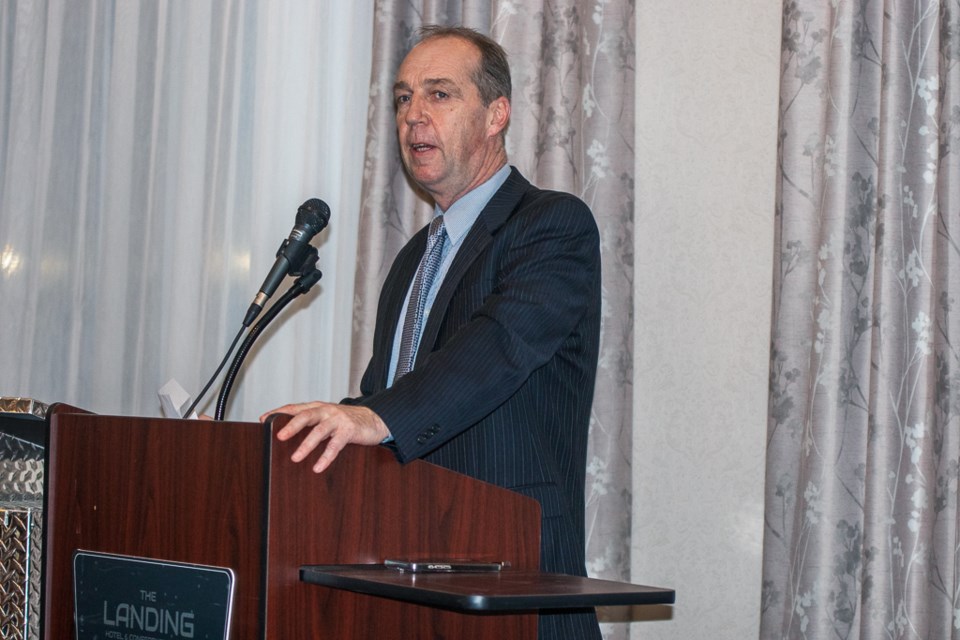ST. PAUL – Maintaining services amid funding challenges remained a focus for the County of St. Paul in 2024 as it did in 2023, according to Reeve Glen Ockerman.
Road maintenance, for example, was a top priority for the County, which involved utilizing better oiling products.
“We maybe didn’t do as many miles of oil as we traditionally have,” but the County used products that should last longer, explained Ockerman.
The idea is to save money in the long-term while maintaining well-oiled roads, particularly arterial roads, he said. While it may be nice to oil more roads and do more dust controls, “it comes down to budget.”
But adding more miles of oiled roads is no longer affordable for the County of St. Paul, he said.
“We truly were just in maintenance mode.”
Challenges
Just like in 2023, costs continued to go up. Fuel prices did not remain stable, Ockerman said, and prices continued to experience an upward trend.
The County did not make many essential capital purchases due to the funding challenges.
“A couple graders did come aboard [and] a loader,” just to help keep things running, he said. “That’s sort of the way the year went.”
The County is also still feeling the pinch from previous revenue sources drying up, such as the Lindbergh salt plant that permanently closed in 2022. “That was a big assessment . . . [and] we lost that.”
The three-year tax holiday for oil companies announced by the province in 2020 also did not help with the already decreasing revenue for the County, according to Ockerman. The tax holiday did not tax new wells and pipe assets, which was meant to encourage industrial development.
Ockerman said he is glad it ended in 2024.
“I never want to see that again,” he said. With the end of the tax holiday, the County will see an influx of revenue from the new pipes and wells created over the past three years included in the assessment roll this year.
Ockerman said the County is also investigating ways to secure other sources of revenue.
For example, in April 2024, County council finalized a gravel pit agreement, which Ockerman hopes could potentially bring more money to the County over the next 25 years.
CAO Jason Wallsmith said the gravel pit agreement “secures a considerable supply of gravel to support future municipal operations,” explaining adequate access to gravel could also allow the County to potentially consider supplying gravel to municipal or provincial projects.
“The County [of St. Paul] has not committed to this path forward as a revenue stream, but it is being investigated,” noted Wallsmith.
Rural Crime
Other ongoing challenges the County tried to manage in 2024 include key national issues like rural crime, said Ockerman.
“I'm not sure if it’s a reflection of the times we're in. You know, the lack of jobs, increasing cost of living – no money,” he said. “But rural crime, it seemed to be for the last five years . . . increased.”
He added, “I’m going to give a little kudos to the RCMP. They’ve been very responsive . . . they went and caught the guys [committing crimes].” But offenders are often released back into the community after being caught, he added.
“[The] same crimes are being committed over and over again, by the same people. That needs to change,” said Ockerman. He believes rising crime can only be addressed by changes in the legislation at the federal level.
“Northeast [Alberta] is a pretty good place to live in . . . but there’s a few bad apples,” said the reeve.
Healthcare
He also acknowledged that healthcare in rural areas remains a challenge. Staff shortages and ED closures, not only in the St. Paul region, but nationwide, are being experienced.
“It’s a monster.”
He is hopeful things will change in the future.
Regulations
Ockerman said red tape and regulations also drive-up costs for the County, which can sometimes prevent the County from pursuing important projects, like fixing boat launches or culverts.
“Even when constructing roads, sometimes, bird surveys, studies and such have to be done,” he said. “I’m not saying [bird surveys are] not valuable but it gets fairly costly just to put a culvert in . . . sometimes these projects cost us an extra $250,000.”
“They make us do the engineering and the bird or the fish studies and on and on,” he explained. “Sometimes consultants and engineering costs more than the project. That's the extra rules and regulations that I'm talking about.”
But Ockerman remains positive, hoping both provincial and federal efforts to reduce bureaucracy will pay off in the future.
Co-operation is key
While there are many challenges faced by the County, Ockerman said municipal co-operation in the region has been positive. A large project that is moving ahead is the MD of St. Paul Foundation’s $50 million Lodge Project, which is being done by the County, the Town of St. Paul, and the Town of Elk Point. The municipalities have made a $4 million upfront commitment.
The project aims to replace and expand Sunnyside Manor with a new 90-unit residential building and lodge services.
Ockerman acknowledged the project is expensive. “It’s scary. It’s a hell of a lot of money, but the walls are falling down,” he said. “The project is needed 100 per cent.”
But the project still requires provincial support, and he is hopeful that the support will come soon.
“Costs don't come down. They seem to keep going up,” acknowledged the reeve.
Municipal election
With a municipal election coming up in October, Lakeland This Week asked Ockerman if he intends to seek re-election.
“We'll make that decision in September, whether my wife allows me, or my health allows me,” said Ockerman.



